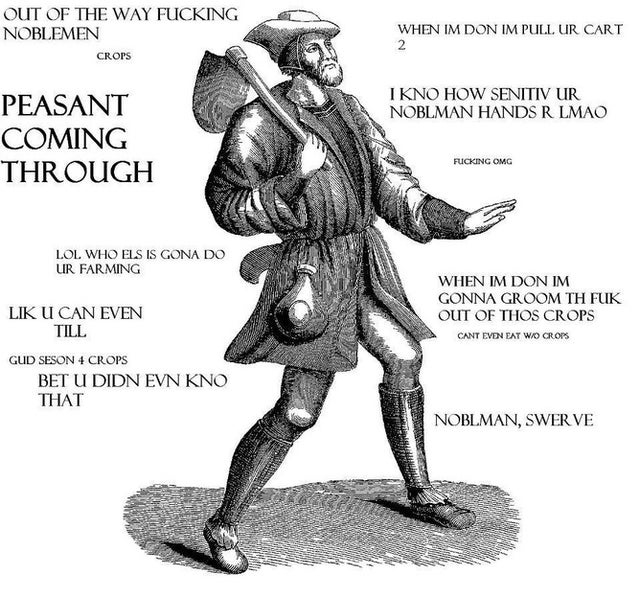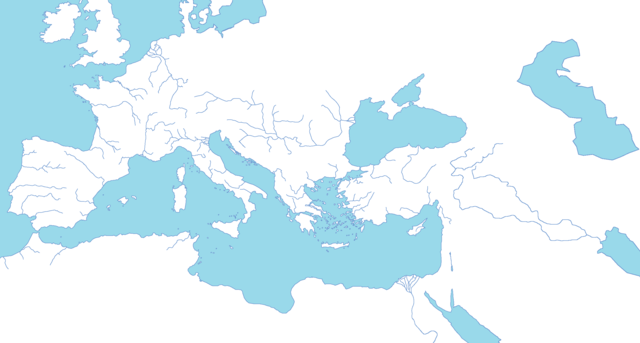They were not, were also often malnourished. Thus each larger epidemics killed a significant number of the population. Not to mention such events like hunger or war.
These popular opinions concern the stereotypical image of the Middle Ages.
'Stereotypical' does not necessarily mean 'untrue'. In recent years we had numerous efforts to present Middle Ages as less dirty and primitive period than it was previously believed to be, but the fact remain it was quite dirty and primitive.
First, the European Middle Ages are only part of world history.
Yes, I was under an impression we're talking about Europe here. And the rest of the medieval world wasn't actually free from famines and pestilences, even if sanitary situation was sometimes a bit better.
Secondly, the vision of the past as a series of wars and disasters is wrong. Certain periods in certain places were more brutal... but the same can be said about these times. Have you forgotten about the two World Wars? Or about contemporary ethnic massacres?
30 years war (1618-1648) lead to the depopulation of Germany by around 40%. Even two world wars didn't achieve such level of depopulation.
Yeah, I remember Covid. During its run global population increased by 80 million people. A far cry from Black Death, wouldn't you say? Not to mention, thanks to scientific breakthroughs most epidemics that ravaged the world aren't really dangerous for us anymore.
Or modern totalitarianisms that have killed millions? All of them are more fierce due to the development of technology and changes in social relations.
The extinguishing of entire nations was also possible before modern totalitarian regimes. Just ask the indigenous people of Americas.
Hunger is a phenomenon that happens from time to time in various places. There is no reason to think that populations in the past were constantly hungry. Moreover, in the 20th century, hunger mainly affected the so-called third world. In the 21st century it will be everyone's problem, all thanks to industrialism and capitalism.
Hunger was endemic in the pre-modern times. The industrial revolution brought forth also breakthroughs in agriculture, thanks to which harvests are much more plentiful. In medieval era Europe could not have a population larger than 100 million people - there was simply not enough land to feed more. Now there are 746 million people living in Europe and the continent is not only feeding itself but also exporting large quantities of food.
Heh. You ignored my objection and supported yourself with anecdotal evidence.
Not at all. Rigid structure of feudalism gave serfs no legal possibilities of advancement. Today we have possibilities of advancement. Some of us use them, some of us don't.
Temporary horizontal transitions and short horizontal promotion in young post-communist economies do not change the fact that the ruling class of this world is very limited and completely undemocratic.
And yet much larger percentage of the population has access to acceptable living conditions, healthcare, education, various goods and services. Never before so many people took advantage of the fruits of civilization.
No. There is a thousand years' difference between the Plague of Justinian and the Black Death. Moreover, the Black Death was a consequence of economic opening to new markets.
What new markets? Black Death came from the far East, most likely China, same as Justinian Plague.
Opening new markets happened after the Black Death.
Medieval economic development was a consequence of the accumulation of experience and a new, post-ancient farming culture. Even in the Dark Ages, the quality of life, its length and the birth rate increased very rapidly. Thanks to Christianity, which was a transmission belt to the prebarbaric Roman culture, and then allowed for further adaptations
Rapidly, sure. I read those calculations. The economic growth in medieval era rarely reached 1% per year. And the surplus was regularly annulled by famine, pestilence, wars. As for birth rate, it was caused by very high infant mortality. When less then half of the children reach adult age, you need to have more of them. That and of course lack of methods of successful prevention.
Pollution - sure. Pauperization - at first to some degree but later the industrializarion caused massive increase in wealth. Not only of the capitalists - trade unions and the threat of socialism slowly forced the factory owners to ameliorate working conditions and increase earnings.
So you admit that the pauperization of workers was a consequence of industrialization and the destruction of rural economic culture?
It was a short-term result. The long-term result was more wealth produced and higher standards of living reached in the cities. Also, for the first time people began having access to modern medicine and mass education. Idealizing the 'rural economic culture' is naive at best.
Much lower infant mortality alone increases the average life expectancy much more than 10 years.
You are trying to change the topic from life expectancy to infant mortality.
Lol, there is no change of subject. Low life expectancy in pre-modern times was partly caused by high infant mortality. If many people reached the age of 0, 1 or 3 before dying, the average life expectancy was lowered. That's pure math for you.
Higher life expectancy in modern age is the result of lower infant mortality and longer lives of the elderly, who in pre-modern times were vulnerable to different diseases. Both aspects contribute to the final effect.
But you know what? Between the Middle Ages and the Renaissance, infant mortality rates increased dramatically. You know why? Because it was increasingly done by doctors instead of traditional midwives (doctors considered washing hands a superstition). This is the power of progress.
Actually ,the doctors appeared on a massive scale much later, after the Renaissance. The connection between not washing hands and infant mortality was found in a hospital in 19th century, if I rebember correctly. And in the end it lead to another medical breakthrough, thanks to which today we're much safer from bacteria and viruses than we were before.
In Bismark's Germany when retirement system was introduced life expectancy of a worker was below 50 years (they started counting it in order to properly set the retirement age). Now its 81 years.
The short lifespan was a consequence of living conditions during industrialization.
Yes, because living conditions in the villages were soooo perfect.
Do you think European workers would live much longer now? The problem was simply transferred to Bangladesh.
Nice that you mention Bangladesh. Average life expectancy there is 72,3 years. Still 20+ years higher than in Bismarck's era Germany.
Not all the world progresses at the same pace. But the progress is a fact.
How about not being disfigured and handicapped by polio or killed by pox?
You're avoiding the question again. You said that we live healthier. Microplastics and health consequences make me doubt it.
Dozens of new diseases have appeared in addition to traditional diseases, and this process will not end.
I'm not avoiding the question. Even with microplastics we live longer and healthier than before modern times. Because profits from defeating pox and other mass epidemics outweight the losses caused by microplastics.
That's why I mentioned travelling, not setting bombs.
And I mentioned going to jail for using incorrect pronouns.
Yeah, now we're definately in anecdotal territory.
Moreover, you forget that the same system of oppression allows violence caused by immigrants.
Where's my freedom?
Don't know where your freedom went, mine is still with me.
And you still didn't leave your village, often because you were not allowed to. In large areas of Europe serfs were legally bound to the land, much like the slaves in American plantations.
You don't know history. This assignment to the land is your part of Europe, and after the Renaissance.
We were talking about Europe as a whole. Which means the practices in central eastern Europe are also part of the conversation.
But even then, the comparison to the American system of slavery is ridiculous, because American slaves lived differently than peasants in Europe, without all the traditional social structure and internal economic relations.
I'm not comparing every aspect of lives in pre-modern Russia and American plantation, just one (being legally bound to land).
You don't know history and you have no comparison.
LOL
Keep idealizing the past. Ignorant people often do.
You know, someone living in the Third Reich might say "but the level of education and medicine is much higher than it was a hundred years ago!"
Fortunately we don't live in Third Reich.
The bottom line is:
I work 8 hours a day, unlike my ancestors, who toiled from dusk till dawn. Also, I didn't have to work as a child. Currently, it's actually forbidden to hire children.
I can read, write and count and have a small library in my apartment. Unlike my ancestors who only could see a book when they attended church, not to mention reading it.
When I am sick, I go to a doctor and receive treatment, not die of fucking pneumonia. Thanks to vaccinations I am immune to diseases that depopulated Europe on numerous occassions.
Unlike my ancestors, I'm not bound to where I was born. Lived in 3 different countries, travelled to many more.
I'm not threatened by famine. When drought comes, I may pay 20% more for food, but it's such a small percentage of my expenditures, It does not hurt me much.
This is all progress. Living conditions in the West are miles above what we had 250 years ago. The difference is much greater than for example, between 1750 and 1500. Or between 1500 and 1250. The difference is Enlightenment, the advent of scientific method, demystifying of our world and many, many breakthroughs in every aspect of human existence.
You can call it Satan's rule if you like. I'll take my universal healthcare and education any day of the week.
























